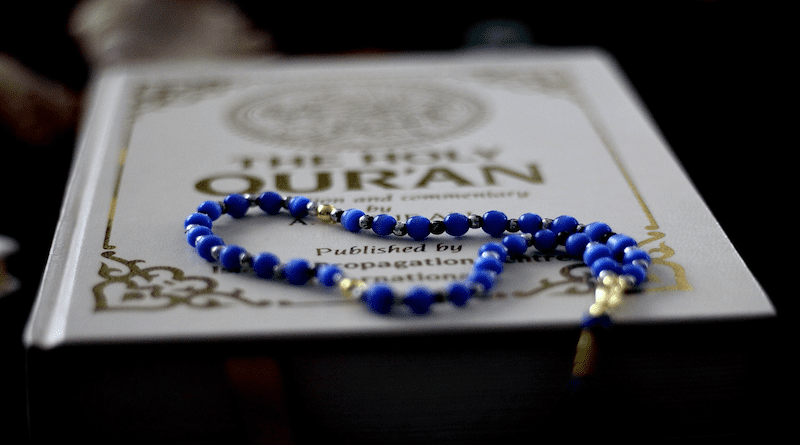Quran’s 99 Names And Torah’s 1 Personal Name – OpEd
The Qur’an contains 99 names (attributes) of the one God while the Torah contains only one personal name of God plus dozens of attributes.
For thousands of years the religions of the Near East, India and China worshipped hundreds of gods, and had hundreds of names for their gods; including several miracle working humans who lived and died among their fellow humans, and were then in retrospect elevated into deities like: Asklepios. Confucius, Siddhartha Gautama and Tin-Hau.
Who was Tin-Hau? She was a young woman who for more than a dozen years had many dream visions of sinking fishing ships that she was able to rescue. Not long after her death at age 28, her story was inscribed on the walls of a sanctuary in Hangchiow, China (in 1228); and she was deified 50 years later by the Mongol emperor Kublai Kahn. So she became a goddess.
But for those religions that trace their prophets back to Prophet Abraham, and his two Prophet sons Ishmael and Isaac, the many names of God simply describe different aspects or attributes of the one God’s multifaceted personality.
God’s names are appellations: titles and descriptions. Thus to say that God is a King or Judge describes one of many ways God acts. To say that God is the Compassionate One is to describe one of many character or personality traits of the one God. Ibn Al-Qayyim writes: The attribute of generosity is an attribute of God who feeds and is not fed. The most beloved creatures to Allah are those who take on his characteristics. Indeed, Allah is noble and loves nobility from his servants, he is knowledgeable and loves the scholars, he is powerful and loves courage, and he is beautiful and loves beauty. (al-Wābil al-Ṣayyib 1/34)
While each of the many ‘names’ for the one God is only one of the many appellations of the one universal creator of space and time; both Islam and Judaism also have one special Divine name that is always in the believer’s heart and soul.
Because the Qur’an is filled with beautiful Arabic poetry, it is not surprising that the Qur’an is also filled with so many names of God.
Because the Jewish tradition reaches back more than thirty five centuries; it is not surprising that Jews have focused on many additional names for the one and only God over those many centuries.
Yet, because all the many names of God call upon the same One God, it is also not surprising that many of the 99 beautiful names of God in Muslim tradition also appear in Jewish tradition, which sometimes refers to the 70 names of God (found in Midrash Shir HaShirim and Midrash Otiot Rabbi Akiba).
Since Islam and Judaism are very close yet uniquely different religions, there are also several Jewish names for God’s attributes that are not found among the 99 names that appear in the Quran. One rabbinic name for God is Shekinah. This Hebrew word is very close in meaning to the Arabic word Sakinah. Both words are feminine gender, but only Jews think of Shekinah as the feminine side of the one and only God. I have written elsewhere about the Sakina-Shekenah connection.
For Jews the most important name of the one God, the name that God himself revealed to Moses at the burning bush, is YHVH: which appears more than 6,800 times in the Hebrew Bible.
In Exodus 3:13-15, Moses said to God, “If I go to the Israelites and tell them, ‘The God of your fathers has sent me to you,’ and they ask me, ‘What is his name?’—what should I say to them?” And God said to Moses, “Ehyeh asher Ehyeh.”
Ehyeh is the verb ‘to be’ in its future tense singular form and means ‘I will/might/may become the one who I may/will/might become,’ indicating that Ehyeh is The God of Potentialities, The God of Possibilities, The Living God of Becoming and Transforming, the One who can liberate Banu/Bnai Israel from bondage in Egypt.
The Torah continues, “And God said, ‘You must say this to the Israelites, “I Am” (the usual mistranslation for God’s self-revealed name) has sent me to you.'” God also said to Moses, “You must say this to the Israelites: Ehyeh, the God of your fathers, the God of Abraham, the God of Isaac, and the God of Jacob—has sent me to you. This is my name forever, and this is my memorial from generation to generation’ (Exodus 3:13-15).
When Jews speak of God in the third person, God’s name is YHVH: “the One who causes being and becoming, the One who brings potentials into existence.”
This name was spoken publicly from the time of Moses and throughout the centuries of the 1st Temple of Solomon, but it was replaced by Adonai (Lord) before the beginning of the 3rd century B.C.E., because God’s actual holy name was eventually considered too holy to utter audibly.
In later centuries even that substitution was considered too holy to utter; and the custom among pious Jews till this day is not to use any name for God at all (except in prayer); but to say HaShem–the name (of God) when speaking about God.
The distinction between the personal intimate name of God that the Jewish believer uses in prayer and when reciting his or her holy scripture versus all other names, is a measure of the believer’s piety and love of the God of his or her own religion.

